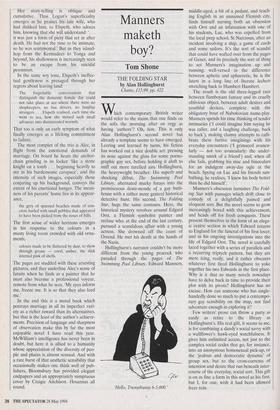Manners maketh boy?
Tom Shone
THE FOLD I NG STAR by Alan Hollinghurst Chatto, £15.99, pp. 422 Which contemporary British writer would refer to the stains that one finds on the sofa the morning after an orgy as having 'authors'? Oh, him. This is only Alan Hollinghurst's second novel but already a template seems to have emerged. Leering and learned by turns, his fiction has worked out a nice double act: pressing its nose against the glass for some porno- graphic gay sex, before holding it aloft to sniff out more rarefied airs: Hollinghurst, the heavyweight breather. His superb and shocking debut, The Swimming Pool Library, alternated murky forays into the promiscuous demi-monde of a gay bath- house with a rather more genteel historical detective hunt. His second, The Folding Star, hugs the same contours. Here, the historical mystery revolves around Edgard Orst, a Flemish symbolist painter and recluse who, at the end of the last century, pursued a scandalous affair with a young actress. She drowned off the coast of Ostend. He met his death at the hands of the Nazis.
Hollinghurst's narrator couldn't be more different from the young peacock who paraded through the pages of The Swimming Pool Library. Edward Manners, Hello, Transylvania 6-5,000.' middle-aged, a bit of a pedant, and teach- ing English in an unnamed Flemish city, finds himself nursing both an obsession with Orst and an infatuation with one of his students, Luc, who was expelled from the local prep school, St Narcissus, after an incident involving a ship, a game of cards and some sailors. It's the sort of scandal that could have wafted over from the pages of Genet, and its precisely the sort of thing to set Manners's imagination up and running; well-versed in the difference between aphetic and aphaeretic, he is the latest in a long line of literate lechers stretching back to Humbert Humbert.
The result is the old three-legged race between flamboyant fantasy and its cruelly oblivious object, between adult desires and youthful devices, complete with the obligatory bout of Nabokovian name-play. Manners spends his time thinking of tender intimacies CI could imagine him saying he was taller, and a laughing challenge, back to back'), making clumsy attempts to calli- brate these furtive imaginings with his everyday encounters CI grimaced avuncu- larly — not too avuncularly: the under- standing smirk of a friend') and, when all else fails, grabbing his mac and binoculars for an indulgent away-day ogle at the beach. Spying on Luc and his friends sun- bathing, he realises, 'I knew his body better than he did himself.
Manners's obsession furnishes The Fold- ing Star with passages which drift close to comedy of a delightfully pained and eloquent sort. But the novel seems to grow increasingly bored with this achievement, and heads off for fresh conquests. These present themselves in the form of an elega- ic centre section in which Edward returns to England for the funeral of his first lover; and in his ongoing investigations into the life of Edgard Orst. The novel is carefully laced together with a series of parallels and a recurring triptych pattern, but they are mere icing, really, and it rather obscures whatever first fired Hollinghurst to yoke together his two Edwards in the first place. Why is it that so many novels nowadays have to delve back in time to provide their plot with its pivots? Hollinghurst has no excuse. How can someone who has single- handedly done so much to put a contempo- rary gay sensibility on the map, not find adventure enough in exploring it?
Few writers' prose can throw a party as easily as retire to the library as Hollinghurst's. His real gift, it seems to me, is for combining a dandy's social savvy with a wallflower's hawk-eyed watchfulness, It gives him unlimited access, not just to the complex social codes that go, for instance, into an anonymous homosexual pick-up, or the 'jealous and democratic dynamic' of group sex, but to the cross-currents of intention and desire that run beneath inter- course of the everyday, social sort. This gift is on as fine a form in this novel as his first, but I, for one, wish it had been allowed freer rein.


























































 Previous page
Previous page